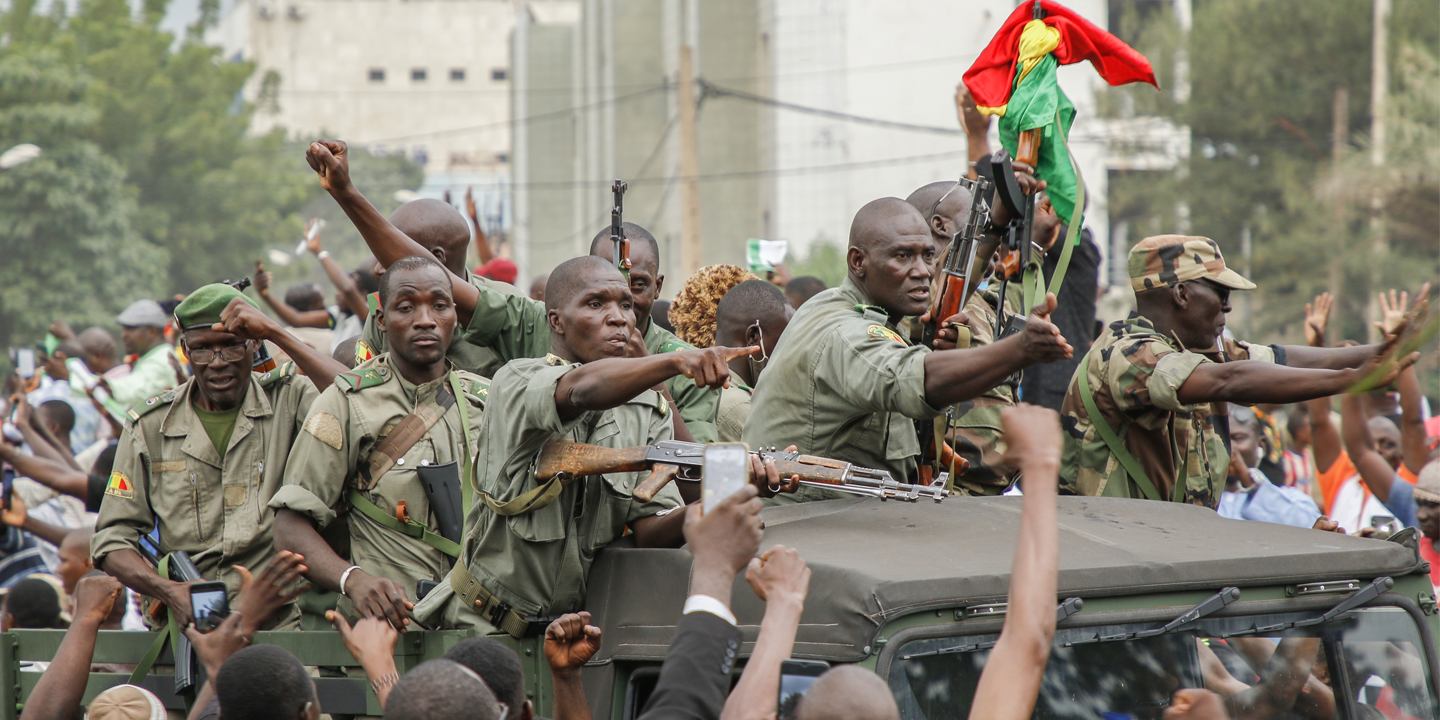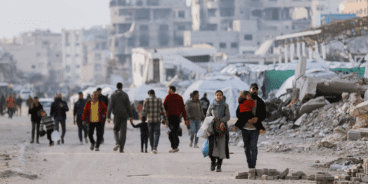

Atrocity Alert No. 216: Mali, Belarus and World Humanitarian Day
Atrocity Alert is a weekly publication by the Global Centre for the Responsibility to Protect highlighting situations where populations are at risk of, or are enduring, mass atrocity crimes.
Mali’s military coup and the protection of civilians
Yesterday, 18 August, Mali’s President Ibrahim Boubacar Keïta, his prime minister, Boubou Cissé, and several other senior government officials were arrested during a military coup. Hours later, President Keïta announced his resignation, dissolving the government and national assembly.
Mr. Keïta’s resignation follows months of protests over alleged corruption and a disputed election. There has also been growing discontent due to pervasive insecurity caused by armed Islamist groups and deadly inter-communal violence. On 10 July security forces shot and killed 14 protesters and bystanders, further inciting widespread political unrest.
Attempts at mediation over the past month by the Economic Community of West African States (ECOWAS) have failed to end the protests or resolve differences between the government and opposition. The military leaders of the coup, the National Committee for the Salvation of the People, said they acted to prevent further chaos in Mali. While the military claim that their coup was ‘bloodless,’ there were reportedly four deaths.
Although crowds in Bamako celebrated yesterday’s coup, it has drawn condemnation from international and regional partners who fear Keïta’s resignation could further destabilize Mali and the Sahel region. ECOWAS has suspended Mali from its decision-making bodies and requested sanctions be imposed on the coup leaders. Earlier today, the African Union suspended Mali’s membership. The UN Security Council (UNSC) will also hold an emergency session today to discuss the crisis.
Following a military coup in 2012, Tuareg separatists and armed Islamist groups seized territory in northern Mali, plunging the country into crisis. Despite a significant international military presence, a UN peacekeeping force (MINUSMA), the 2015 Algiers accord and ongoing peace talks, insecurity has continued to spread across Mali and into neighboring states in the Sahel region. Increased attacks by armed Islamist groups have also contributed to a cycle of deadly inter-communal violence that has killed at least 589 civilians in central Mali so far this year.
In recent years the Malian armed forces have failed to provide adequate protection to vulnerable populations and have, at times, perpetrated crimes against civilians during counter-terrorism operations. In a private report submitted to the UNSC on 7 August, UN experts accused senior Malian army and intelligence officials of “compromising” the implementation of the Algiers peace accord and alleged that the former head of the armed forces left the village of Ogossagou unprotected before a February 2020 massacre that left 35 civilians dead.
Dr. Simon Adams, Executive Director of the Global Centre for the Responsibility to Protect, said that, “while the long-term impact of the military coup is unclear, it clearly threatens to plunge Mali into deeper crisis. As the situation continues to unfold, all of Mali’s military and political leaders must put human rights and the protection of civilians at the center of discussions regarding the country’s future.”
Protesters in Belarus face police violence, mass detention and torture
On 9 August Belarus held presidential elections. When it was announced that President Alexander Lukashenko had won 80 percent of the vote, anti-government protesters immediately took to the streets alleging widespread and systematic electoral fraud. A crackdown by security forces has resulted in at least two protesters being killed and more than 300 hospitalized with serious injuries. Security forces have sometimes used live ammunition against protesters, while also violently attacking mass demonstrations and abducting activists off the streets.
The UN High Commissioner for Human Rights, Michelle Bachelet, condemned the violence on 12 August, saying that, “I remind the Belarussian authorities that the use of force during protests should always be exceptional and a measure of last resort, clearly differentiating between any violent individuals and peaceful protesters, against whom force should not be used.”
More than 6,700 people have been detained, including bystanders and minors, as a result of protests held over the past week. There have been widespread allegations of torture and of inhuman and degrading treatment inflicted on detainees. Five UN Special Rapporteurs have raised alarm at the government’s efforts to curtail freedom of expression, including by detaining dozens of journalists, bloggers and human rights defenders.
President Lukashenko has held power since 1994 and Belarus has one of the worst human rights records in Europe. Earlier today Lukashenko, who has been described as “Europe’s last dictator,” called for police to end all protests in the national capital, insisting that “there should no longer be any disorder in Minsk of any kind.”
The violence in Belarus highlights a growing trend of government security forces using potentially deadly force against largely peaceful protest movements around the world, contravening international laws and standards that protect universal human rights.
On 13 August demonstrations in Abidjan, Côte d’Ivoire, against President Alassane Ouattara’s announcement to run for a third term were met with a violent police response, resulting in several deaths. According to Amnesty International, police allegedly collaborated with groups of men armed with machetes who attacked and dispersed protesters. Elections have previously served as a trigger for identity-based violence and atrocities in Côte d’Ivoire, notably when more than 3,000 civilians were killed following President Ouattara’s election in 2010.
Jaclyn Streitfeld-Hall, Publications Director at the Global Centre for the Responsibility to Protect, stressed that, “patterns of arbitrary detention, extreme violence and the reckless use of potentially lethal force create an environment conducive to the commission of potential crimes against humanity.” All governments must ensure that crowd control measures are consistent with international standards, including respect for the right to peaceful assembly and association. Security forces must strictly comply with the principles of necessity, proportionality, legality and precaution to help prevent deaths or serious injuries.
World Humanitarian Day
Today, 19 August, marks World Humanitarian Day, which pays tribute to humanitarian workers who risk their lives while assisting the most vulnerable populations in the world. With over 80 million people currently displaced by conflict, persecution and atrocities, the vital work of humanitarian organizations has never been more important. Over the past six months humanitarian workers have played a vital role during the COVID-19 pandemic in providing access to clean water, sanitation and medical facilities for refugees and other displaced persons.
According to the Aid Worker Security Database (AWSD), 2019 surpassed all previous years in the number of major attacks on humanitarian workers. According to AWSD, 277 separate attacks last year resulted in 125 aid workers being killed, 124 kidnapped and 234 wounded. The majority of attacks took place in Syria, South Sudan, Democratic Republic of the Congo, Afghanistan and the Central African Republic. In Yemen and Mali, attacks on humanitarian workers doubled during 2019. All of these countries are also currently on the Global Centre’s list of “Populations at Risk.”
Last week a humanitarian worker was killed in north-west Cameroon, where attacks have spiked over the past year due to the deteriorating armed conflict in the Anglophone regions. Three foreign aid workers were also recently ambushed and killed in Niger.
Vital humanitarian aid can mean the difference between survival and death for millions of people around the world. Deliberate attacks on humanitarian workers in conflict zones constitute war crimes under International Humanitarian Law. They are often also linked to attempts to perpetrate other mass atrocity crimes against civilian populations.
Related Content


Atrocity Alert No. 433: Israel and the Occupied Palestinian Territory, Myanmar (Burma) and Mali
